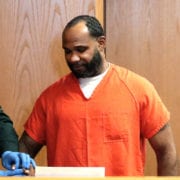SENTENCING UPDATE: Lakeland man sentenced to life for attempted second-degree murder
Judge Wayne Durden told Tyrone Laster Monday that there wasn’t a single aspect of his case that wasn’t tragic.
Laster, 43, shot his friend Chauncey Rollins in the back of the head over a money discrepancy in a drug deal. Rollins was $20 short after finalizing a deal, and Laster was angry about it.
“You don’t think I’ll shoot you?” Laster asked Rollins on June 10, 2015, placing the gun on the back of his head and eventually pulling the trigger.
Rollins was in a coma for two months, lost the use of his arms and legs and is confined to a wheelchair.
Prior to the sentencing, Laster’s attorney asked Durden to show mercy on him, but Assistant State Attorney Michael Nutter told the judge Laster should be sentenced to the fullest.
Laster’s actions may not have resulted in death, Nutter said, but they did result in a life condemned to a wheelchair.
“He had a life, and it was taken from him,” Nutter said. “The state is asking the court to show no mercy. He (Laster) did not show mercy to Chauncey.”

Laster, 43, of Lakeland, gets fingerprinted Monday after being sentenced to life in prison for attempted second-degree murder.
Durden sentenced Laster to life in prison, adding that the case is an extreme result of drugs and drug use.
“If not for their involvement in drugs, neither would be here today,” Durden addressed both Laster and Rollins. “The defendant has ruined his own life. The victim has significantly diminished the quality of his own life.”
Durden also reminded Laster that he was a habitual offender with a criminal history that spanned 22 years, resulting in a total of 15 felonies and 22 misdemeanors.
“Laster, this is one of the tragic things about this case,” Durden said, referring to his family’s testimony. “It’s amazing to me how much potential you have, and you’ve wasted it.”








